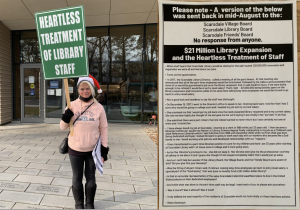#TimesUp Movement at the Golden Globes

January 14, 2018
Many of us spent last Sunday night watching our favorite actors and actresses walk down the red carpet at the Golden Globes dressed completely in black. Some of us were confused, as red carpets are an essential part of award shows and each famous figure is usually dressed in a unique way. The red carpet is something of a fashion show, where the women are judged on their appearance first and their work second. However, this year, actors and actresses wore black in support of the #TimesUp movement. Their dress was not about their look, but about their mission. The #TimesUp Movement is a call for change from women in entertainment to women everywhere that addresses the systemic inequality that has kept women from reaching their full potential in the workplace. It enforces a zero tolerance policy for harassment, discrimination, and abuse, and was started by women who are passionate about putting an end to injustice in the workplace. So many actors and actresses showed their support that the event was a sea of black. In addition, some actresses brought activists from industries outside of media as their dates because they wanted to show that the movement impacts women in all workplaces, not just Hollywood. They wanted to spread awareness, and they were very effective. #TimesUp posts dominated social media during and after the event and were able to reach millions of people across the nation and the world.
Though of course everyone interpreted this immense support for the movement in a different way, many seemed to believe that though it was positive step, it was not enough. “I think that the movement in general has a good message, but I don’t think they’re doing enough. Simply wearing black at an awards show isn’t going to end sexual harassment or inequality everywhere. Raising awareness is critical, but it’s only the first step, and I don’t know if the movement is equipped to take action for a second step,” said Holly Shuster ’20 when asked her opinion of the effectiveness of the movement. Ariel Stern ’20 agreed. “I think it will be effective but not in its current form. They have a lot of influential people on their side, but they’re not doing enough with it right now. I do think they have a lot of potential and enough support to make a change, but they need to figure out how,” she said. Both Shuster and Stern think that the actions at the Golden Globes were only a starting point, and that more needs to be done. The question that remains is: What? What can be done to end this inequality, especially since it is on such a large scale? Despite these flaws and our remaining questions, the #TimesUp movement brought much needed attention to these issues, and is the first step in ending cyclic injustice.



























